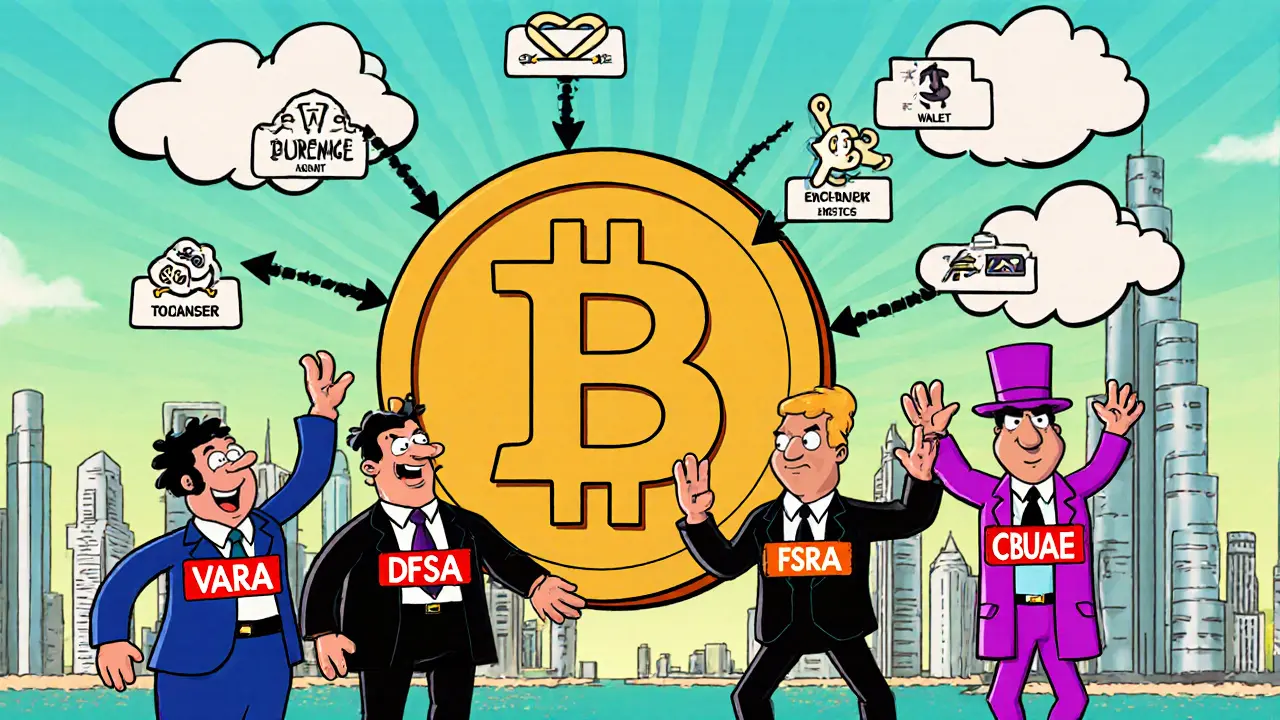UAE Crypto Regulatory Calculator
This tool identifies which UAE regulatory body applies to your crypto business based on service type and location. The UAE has multiple regulators for different crypto activities and jurisdictions.
Your Regulatory Authority
The United Arab Emirates doesn’t just tolerate cryptocurrency-it actively invites it. While countries around the world struggle with bans, delays, or confusion, the UAE has built one of the clearest, most business-friendly crypto frameworks on the planet. If you’re trading Bitcoin, holding altcoins, or running a crypto business, the UAE isn’t just an option-it’s becoming the default choice for serious players in the Middle East and beyond.
Who’s in Charge? The UAE’s Multi-Layered Crypto Regulators
The UAE doesn’t have one crypto regulator. It has five, each with a specific role. This isn’t chaos-it’s precision. The system lets businesses pick the best home for their needs, whether they’re a global exchange, a local wallet provider, or a DeFi startup.Dubai’s Virtual Assets Regulatory Authority (VARA) handles most crypto businesses outside the financial free zones. If you’re running a crypto exchange, custody service, or token sale in Dubai, VARA is your main contact. They’ve got clear rules: you need to be incorporated in Dubai, show you have enough cash on hand (between AED 100,000 and AED 1.5 million), and prove your team is trustworthy. Application fees start at AED 40,000, and you’ll pay annual supervision fees up to AED 200,000.
Inside the Dubai International Financial Centre (DIFC), the Dubai Financial Services Authority (DFSA) steps in. They treat crypto like traditional finance-so if you’re a fund manager or broker dealing with crypto as an investment, DFSA is your regulator. Meanwhile, in Abu Dhabi, the Financial Services Regulatory Authority (FSRA) oversees similar activities in the Abu Dhabi Global Market.
At the federal level, two bodies cover the rest. The Securities and Commodities Authority (SCA) watches over crypto that acts like an investment, like security tokens. The Central Bank of the UAE (CBUAE) handles payment tokens-basically, anything you use to buy stuff. This split ensures no gap in oversight, whether you’re trading Ethereum or using Bitcoin to pay for a meal.
What’s Allowed? The Six Licensed Crypto Services
VARA spells out exactly what you can do legally in Dubai. There are six licensed activities:- Exchange services (buying/selling crypto for fiat or other crypto)
- Broker services (matching buyers and sellers)
- Transfer services (moving crypto between wallets)
- Custody services (holding crypto for clients)
- Wallet provision (offering crypto wallets to users)
- Token issuance (creating new crypto tokens)
Token issuance gets extra scrutiny. If you’re launching a new token, you’ll need either a VARA license plus specific approval (Category 1), or you can work through a licensed distributor (Category 2). Some tokens-like those used only within a closed ecosystem, like a loyalty program-are exempt but still under VARA’s watch.
What’s not allowed? Unlicensed trading, anonymous wallets, or using crypto to bypass AML rules. All licensed providers must know who their customers are. No exceptions.
Tokenization, NFTs, and DeFi: The UAE Isn’t Waiting
The UAE didn’t just regulate Bitcoin and Ethereum. It looked ahead. In 2025, the rules expanded to include:- Non-fungible tokens (NFTs) as digital assets
- Decentralized finance (DeFi) protocols
- Tokenized real estate, gold, and other physical assets
Real-world asset tokenization is a big deal here. Banks, developers, and investors are turning property, art, and even oil contracts into blockchain-based tokens. VARA and FSRA have created special pathways for these institutional-grade projects. You can now legally issue a token representing a share in a Dubai skyscraper-and sell it to investors globally, under full regulatory supervision.
DeFi protocols aren’t banned-they’re being brought into the fold. If your DeFi app interacts with users in the UAE, you’re expected to comply with KYC and AML rules. The regulators aren’t trying to kill innovation. They’re trying to make it safe and scalable.

Bitcoin and Altcoins: No Restrictions, Just Rules
There’s no list of banned altcoins in the UAE. No government says, “You can’t trade Solana.” The rules apply to how you operate, not which coins you use. Whether you’re dealing with Bitcoin, Dogecoin, or a new meme token, the same licensing and compliance rules apply.That’s a huge difference from places like China or India, where certain coins are outright banned. In the UAE, your focus isn’t on which tokens to avoid-it’s on whether your business is licensed. If you’re running a crypto exchange, you can list any token you want-as long as you’ve got the right license and follow the rules.
Even retail users benefit. Since August 2025, all merchants in the UAE (except those in financial free zones) must only accept crypto payments through licensed providers. That means if you’re buying coffee with Bitcoin, the café is using a regulated gateway. Your money is safer. The system is more transparent.
Taxes: Crypto Is Mostly Tax-Free-For Now
One of the biggest draws? No VAT on most crypto transactions. Since November 15, 2024, buying, selling, or exchanging Bitcoin, Ethereum, or any other crypto is exempt from the 5% VAT that applies to most goods and services.But there’s a catch. The UAE is rolling out the Crypto-Asset Reporting Framework (CARF), starting September 20, 2025. This isn’t a tax-it’s a reporting rule. Crypto exchanges, custodians, and wallet providers must now collect and report detailed data on their users: names, addresses, transaction histories, balances, and residency status.
The timeline is clear:
- Public consultation ends November 8, 2025
- Final rules come out in 2026
- Implementation starts January 1, 2027
- First automatic data exchange with other countries happens in 2028
This means if you’re a UAE resident trading crypto, your activity will eventually be shared with tax authorities in your home country. The UAE isn’t taxing you now-but it’s preparing for global tax transparency. If you’re a foreigner living in the UAE, you’re still exempt from local crypto taxes, but your home country might not be.

Why the UAE Beats the Rest
Compare this to the U.S., where crypto rules vary by state and federal agencies often contradict each other. Or Europe, where MiCA is still being implemented and taxes on crypto are common. The UAE offers something rare: clarity, speed, and support.Over 400 crypto companies have moved operations here since 2022. Binance, Crypto.com, and Bybit all have licenses. BitGo and Laser Digital provide institutional custody. Startups are launching tokenized funds and DeFi platforms with legal certainty.
The UAE doesn’t just allow crypto. It builds infrastructure for it. Licensing is digital-first. Applications are online. Supervision is ongoing but not punitive. The goal isn’t to control-it’s to attract, grow, and lead.
What You Need to Do If You’re Starting a Crypto Business
If you’re thinking of launching a crypto service in the UAE, here’s what you need:- Choose your jurisdiction: VARA (Dubai), DFSA (DIFC), or FSRA (Abu Dhabi)
- Incorporate your company locally-no offshore shells allowed
- Meet capital requirements (AED 100,000 to AED 1.5 million)
- Pass fit-and-proper checks on founders and key staff
- Build a full AML/CFT compliance program
- Implement secure tech systems (cold storage, encryption, audits)
- Get insurance for digital asset custody
- Set up detailed record-keeping systems
The process takes 3-6 months. But once you’re licensed, you’re in one of the most stable, respected crypto markets in the world.
What’s Next for UAE Crypto Regulation?
The framework isn’t finished. In 2026, CARF final rules will drop. In 2027, reporting begins. By 2028, the UAE will be exchanging crypto data with over 100 countries under global standards.Expect more rules around AI-driven trading, stablecoins, and CBDCs. The UAE is already testing its own digital dirham. But the direction is clear: more innovation, more oversight, more global integration.
If you’re in crypto, the UAE isn’t just open-it’s open wide. The rules are strict, but they’re fair. The taxes are low. The future is bright. And for now, it’s still one of the few places where you can build a crypto business without fighting the government.
Is Bitcoin legal in the UAE?
Yes, Bitcoin is fully legal in the UAE. You can buy, sell, hold, and trade Bitcoin without restrictions. The only requirement is that any business offering crypto services-like exchanges or wallets-must be licensed by VARA, DFSA, FSRA, SCA, or CBUAE. Individual users face no legal barriers to owning or using Bitcoin.
Are altcoins regulated differently than Bitcoin in the UAE?
No, altcoins are not regulated differently. The UAE treats all virtual assets the same under its licensing framework. Whether it’s Bitcoin, Ethereum, Solana, or a new meme coin, the rules depend on how you use it-not which coin it is. Exchanges, custodians, and issuers must follow the same compliance standards regardless of the token.
Do I pay taxes on crypto in the UAE?
No, there is no capital gains tax or VAT on crypto transactions for individuals or businesses in the UAE. However, starting in 2027, crypto service providers must report user data under CARF. This means your trading activity may be shared with your home country’s tax authority. The UAE itself doesn’t tax crypto profits, but your country of residence might.
Can I open a crypto exchange in the UAE without a license?
No. Operating a crypto exchange without a license from VARA, DFSA, or FSRA is illegal. Unlicensed exchanges risk fines, shutdowns, and criminal charges. The UAE requires all exchanges to be incorporated locally, meet capital requirements, and pass strict AML checks. Only licensed providers can legally offer trading services to users in the UAE.
Is crypto payment allowed in UAE stores?
Yes, but only through licensed providers. Since August 2025, all merchants in the UAE (except those in financial free zones) must use regulated gateways to accept crypto payments. This means you can pay with Bitcoin at a café or store-but the payment must go through a VARA or FSRA-licensed processor, ensuring compliance and consumer protection.
What happens if I don’t comply with UAE crypto regulations?
Non-compliance can lead to heavy penalties. Unlicensed operators face fines of up to AED 5 million, asset freezes, and criminal prosecution. Licensed entities that violate AML rules or misrepresent their services can lose their license, face suspension, or be barred from operating in the UAE. The regulators actively monitor and audit licensed firms, and penalties are enforced consistently.

Arthur Coddington
November 11, 2025 AT 10:20The UAE is turning crypto into a theme park ride-safe, sanitized, and totally boring. Where’s the wild west? Where’s the innovation that doesn’t need a 47-page compliance checklist? They’re not building the future-they’re packaging it in a corporate brochure with a Dubai skyline on the cover.
Phil Bradley
November 11, 2025 AT 18:30Let’s be real-this isn’t freedom, it’s corporate capture with a sand dune view. The UAE doesn’t love crypto, they love the tax revenue and the prestige. They’ve turned blockchain into a luxury brand, like Rolex for tech bros. You don’t get to be a pioneer when your rules are written by lawyers in Armani suits.
Stephanie Platis
November 12, 2025 AT 22:44Actually, the UAE’s regulatory framework is remarkably well-structured: five distinct authorities, clearly delineated jurisdictions, and a transparent licensing process-unlike the U.S., where the SEC, CFTC, FinCEN, and 50 state regulators all scream at each other in a hallway. The UAE isn’t perfect-but it’s coherent. And coherence matters.
Michelle Elizabeth
November 13, 2025 AT 02:39It’s funny how the same people who scream about ‘decentralization’ are now lining up to get a UAE business license like it’s a VIP pass to some crypto country club. The irony? You’re trading one centralized power (the Fed) for another (VARA). Welcome to crypto colonialism.
Joy Whitenburg
November 13, 2025 AT 04:15ok but like… i just wanna buy coffee with btc and not get flagged by some robot? the fact that uae made it so you can actually do that without worrying? kinda chill?? 🤷♀️
Kylie Stavinoha
November 13, 2025 AT 12:25The UAE’s approach reflects a deeper cultural truth: order is not the enemy of innovation-it is its necessary container. In a world drowning in chaos, the UAE has built a harbor. Not for the reckless, but for the serious. The tokenized real estate projects, the institutional custody solutions-they’re not just business models. They’re blueprints for a new financial architecture. And yes, it’s regulated. But regulation, when thoughtful, is not oppression-it is stewardship.
Diana Dodu
November 14, 2025 AT 10:42Why are Americans so jealous? You can’t even get a decent crypto ATM in New York without a permit from three different agencies. The UAE doesn’t ask for permission-they just build. And if you don’t like it? Stay in your crumbling democracy with your 20-year-old crypto laws. We’re moving forward. You’re stuck in 2017.
Raymond Day
November 14, 2025 AT 12:22UAE = crypto Disneyland 😎💸 But guess what? Even Mickey has rules. You can’t run around naked and scream ‘free money!’ here. And honestly? Good. If you’re building a DeFi protocol and you think KYC is ‘oppression’-you’re not a pioneer. You’re a liability. The UAE gets it: innovation needs guardrails. Not chains. Just rails. 🚂
Noriko Yashiro
November 15, 2025 AT 22:08Love how the UAE treats crypto like infrastructure-not a fad. The fact that they’ve included NFTs and tokenized real estate in the framework shows they’re not just playing catch-up. They’re designing the next decade. Hats off. Even if I’m from the UK, I’m envious.
Atheeth Akash
November 17, 2025 AT 21:07Very good structure. In India we still struggle with banks refusing to work with crypto firms. UAE shows how regulation can enable, not block. Respect.
Rebecca Saffle
November 19, 2025 AT 05:46Oh please. The UAE is just a tax haven with palm trees. They don’t care about crypto-they care about rich Americans moving their money here to hide from the IRS. And now you’re all acting like they’re saints? Wake up. This isn’t innovation. It’s laundering with a view.
Adrian Bailey
November 19, 2025 AT 11:54Man, I just read this whole thing and honestly? I’m kinda blown away. Like, I thought crypto was this wild, lawless thing-but the UAE made it feel… safe? Like, I could actually start a wallet service here without needing a law degree and a fortune. And the no-VAT thing? That’s a game changer. I’ve been thinking about moving my dev team over. The infrastructure just makes sense. I mean, yeah, it’s regulated-but isn’t that better than getting shut down by the SEC tomorrow? 🤔
Rachel Everson
November 21, 2025 AT 02:51For anyone thinking about launching a crypto business: start with VARA if you’re in Dubai. Their portal is actually user-friendly, and they have live chat support. Don’t skip the AML training-it’s not a formality, it’s your shield. And yes, the AED 100K capital requirement hurts, but it filters out the scammers. This isn’t a free-for-all-it’s a filtered playground. And honestly? That’s what the industry needed.
Johanna Lesmayoux lamare
November 22, 2025 AT 01:31Finally, someone got it right. No taxes, clear rules, no bans. Just… let people build.
ty ty
November 23, 2025 AT 09:37Wow. The UAE. So progressive. So brave. So… corporate. Next they’ll require you to wear a suit to mine Bitcoin. Congrats. You turned decentralization into a corporate retreat with free shawarma.
BRYAN CHAGUA
November 23, 2025 AT 22:12This is the kind of forward-thinking governance the crypto world desperately needed. The UAE didn’t wait for consensus-they led with clarity. That’s leadership. Not all countries can do it, but that doesn’t mean we shouldn’t celebrate those who do. This isn’t just good for crypto-it’s good for global financial evolution.
Debraj Dutta
November 25, 2025 AT 02:50India needs to learn from this. Regulation doesn't mean repression. Clarity means trust. Trust means adoption. Simple.